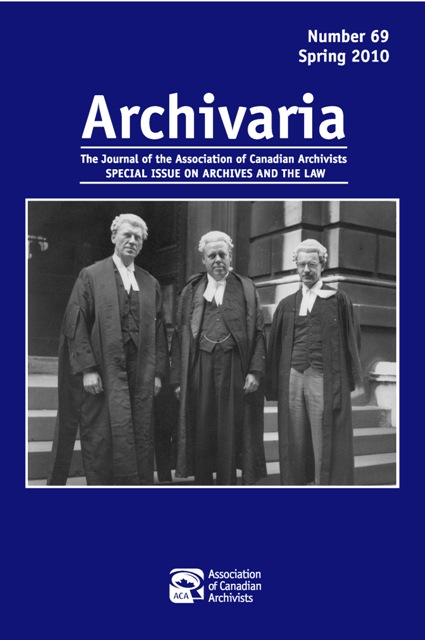Returning Evidence to the Scene of the Crime: Why the Anfal Files Should be Repatriated to Iraqi Kurdistan
Abstract
On 22 April 2008, five years after the American invasion of Iraq, the Society of American Archivists (SAA) and the Association of Canadian Archivists (ACA) issued a joint statement calling for American authorities to repatriate millions of captured intelligence documents and intervene with the “government of Kurdistan” to return the Iraqi Anfal files to the Iraq National Library and Archive in Baghdad. The Anfal files, which chronicle Iraq’s genocide against the Kurds during the mid- to late-1980s, were captured by Kurdish peshmerga in the March 1991 uprisings following the first Gulf War. They were transferred to the United States for safe storage and analysis for human rights crimes with the understanding that the documents were Kurdish property. The SAA and ACA based their statement on the archival principle of the inalienability of national records, a concept that claims that the alienation of national records can only occur through a legislative act of the state. This principle of inalienability, however, is incompatible with the laws of war that allow for the capture of state records during hostilities, conflicts with the international legal regime of human rights regarding the restitution of state security files to a repressive regime that may reuse them, and contradicts the original agreement between American and Kurdish authorities governing ownership of the Anfal files. Indeed, with the growing appearance of a new Iraqi repressive regime – with one faction ruling at the expense of the others – there is considerable danger in repatriating the Anfal files and Hussein’s archive of atrocity to the ruling theocrats in Baghdad before political reconciliation takes root. Reasons of historical patrimony and provenance also argue for the return of the Anfal documents to Iraqi Kurdistan.
RÉSUMÉ
Le 22 avril 2008, cinq ans après l’invasion américaine de l’Iraq, la Society of American Archivists (SAA) et l’Association of Canadian Archivists (ACA) ont émis une déclaration commune demandant aux autorités américaines de rapatrier les millions de documents du renseignement saisis et d’intervenir auprès du « gouvernement du Kurdistan » afin de retourner les dossiers de l’Anfal iraquien à la Iraq National Library and Archive, à Bagdad. Les dossiers de l’Anfal, qui documentent le génocide iraquien des Kurdes durant la deuxième moitié des années 1980, avaient été saisis par les peshmergas kurdes pendant les insurrections de mars 1991 suite à la première guerre du Golfe. Ils ont été transférés aux États-Unis pour entreposage sécuritaire et pour les analyses dans l’optique des crimes contre l’humanité, tout en demeurant propriété kurde. La SAA et l’ACA ont basé leur déclaration sur le principe archivistique de l’inaliénabilité des documents nationaux, concept qui affirme que l’aliénation des documents nationaux ne peut se faire que par un acte législatif de l’état. Ce principe de l’inaliénabilité, cependant, est incompatible avec les lois de la guerre qui permettent la saisie de documents d’état pendant les hostilités; il entre en conflit avec le régime légal international en matière de droits humains au sujet de la restitution des dossiers de sécurité d’état à un régime répressif qui pourrait s’en servir à nouveau; et il contredit l’entente d’origine entre les autorités américaines et kurdes au sujet du droit de propriété des dossiers de l’Anfal. En effet, étant donné l’apparence montée d’un nouveau régime répressif en Iraq – avec une faction qui gouverne au détriment des autres – il y a un danger considérable de rapatrier les dossiers de l’Anfal et les archives des atrocités d’Hussein aux théocrates au pouvoir en Iraq avant qu’aucune réconciliation politique n’ait pu s’enraciner. Les notions de patrimoine historique et de provenance encouragent aussi le retour des documents de l’Anfal au Kurdistan iraquien.
Authors of manuscripts accepted for publication retain copyright in their work. They are required to sign the Agreement on Authors' Rights and Responsibilities that permits Archivaria to publish and disseminate the work in print and electronically. In the same agreement, authors are required to confirm that "the material submitted for publication in Archivaria, both in its paper and electronic versions, including reproductions of other works (e.g. photographs, maps, etc.) does not infringe upon any existing copyright." Authors of manuscripts accepted for publication retain copyright in their work and are able to publish their articles in institutional repositories or elsewhere as long as the piece is posted after its original appearance on archivaria.ca. Any reproduction within one year following the date of this agreement requires the permission of the General Editor.





